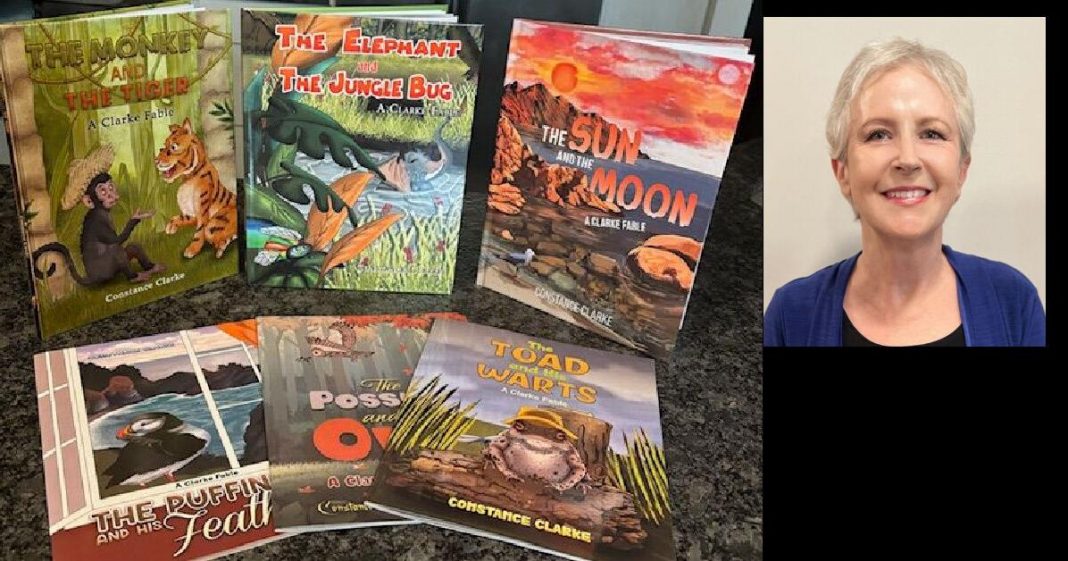Constance Clarke, a writer hailing from Schenectady, is on a quest to create modern-day fables that resonate with the contemporary reader.
“Growing up, I was fascinated by ‘Aesop’s Fables.’ As I embarked on my journey as a writer, I realized that those fables were crafted ages ago. It’s high time we had some fables that reflect the realities of the 21st century,” shared Clarke.
Over the past four years, Clarke has collaborated with Austin Macauley Publishers to pen and publish a collection of six illustrated fables. These stories convey important life lessons such as the significance of kindness and the harm in harboring anger.
“While very young children might not grasp the moral immediately, they do remember the story. As they grow older and wiser, they start to comprehend the underlying truth of the story,” Clarke explained.
Born in Maine and brought up in Schenectady, Clarke dedicated most of her professional life to special education. It was only after her retirement that she embarked on her writing journey.
“I’ve always had a fondness for writing, but I didn’t seriously pursue it until I was nearing 70,” Clarke revealed.
Her initial works were poetry collections, inspired by the serene beauty of the Adirondacks, where her family owns a cabin. However, the onset of the pandemic and the various “cures” for COVID that were making headlines sparked the idea for her first fable.
“During the COVID crisis, everyone was scrambling to find answers. Some of the proposed cures or preventions were quite unusual. This inspired me to write a children’s story about the importance of seeking answers in the right places,” Clarke said.
This idea evolved into “The Monkey and the Tiger,” the inaugural story of the Clarke Fable series. The series also includes “The Sun and the Moon,” “The Elephant and the Jungle Bug,” “The Possum and the Owl,” “The Puffin and His Feathers,” and her latest, “The Toad and His Warts.”
The last story revolves around a young toad who takes pride in his warts but faces a predicament when he attempts to count them all and ends up in the mud.
“The story is a testament to the power of perseverance,” Clarke said.
“The Puffin and His Feathers” narrates the transformation of a puffin as it molts, paralleling a child’s healing journey. At its heart, the fable is about hope, a sentiment Clarke deeply needed while undergoing cancer treatment, including chemotherapy and radiation, in 2020 and 2021.
“I wrote this story for children grappling with serious illnesses, who might be confused about the changes in their bodies. I wanted to instill hope in them,” Clarke said.
Clarke has taken her fables and their messages to local schools, conducting readings and using STEM (science, technology, engineering, and math) activities to help children better understand the stories.
“When I read my fables to elementary school students, I bring along stuffed toy animals that represent the characters in the story. We discuss the characteristics of these animals and how they are portrayed in the story,” Clarke said.
She also volunteers with the Reading Is Fun program, reading to elementary-school-age children in Schenectady.
Clarke’s fables, aimed at children aged 6 and under, have been translated into several languages. She hopes to reach children globally with her stories.
“I hope that children worldwide will be introduced to these stories. I believe that the shared understanding from these fables can foster connections and unity in our increasingly divisive world,” Clarke said.
These stories also serve as a legacy for her five grandchildren, for whom she is reserving copies.
Clarke is currently working on her next fable, “Beavers Tail,” which is set to release this fall. The story aims to teach children about the importance of environmental stewardship.
Clarke’s fables are available at Open Door Bookstore and online through most major booksellers. For more information and to contact Clarke for school programs, visit austinmacauley.com.




Disagree – The use of modern technology and themes in fables detracts from their traditional charm.
Bad punctuation and grammar, uncaring
needs more traditional elements to retain fable charm